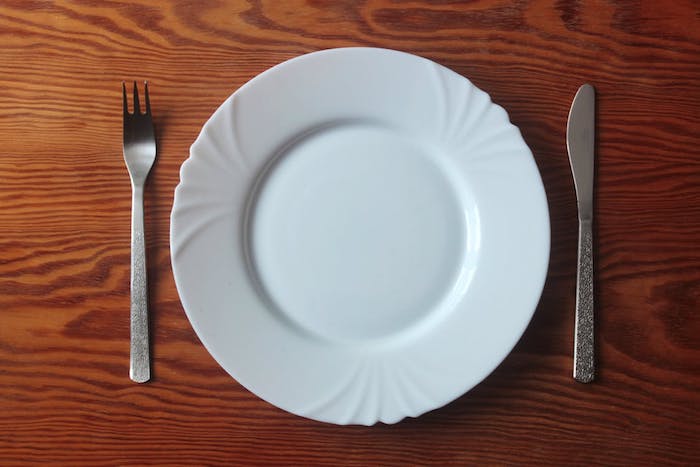Fasting sounds scary. It sounds like something you should only do before major medical procedures or if you are on some meditative monk-like journey to find yourself. All it really means is that you don’t have to stuff your face everytime you feel a tinge of hunger.
Think of fasting as a form of discipline. You don’t have to give into every evolutionary need all the time. Sometimes it may benefit you to practice a little restraint and discipline.

Our ancestors may have been forced to fast when food was scarce just like they were forced to exercise when escaping from predators or hunting for food. In modern times, integrating fasting and exercise may not be such a bad idea.
Is it normal to get “hangry”?

There are scientific explanations of why you might get “Hangry” when you don’t eat for an extended period of time. I call it simply an addiction to food. Break the addiction like you would break the addiction to anything else, training and self discipline.
Our body and brain needs glucose to live but our body knows how to create its own glucose through a process known as gluconeogenesis. As long as your have a proper amount of fat stores for your body to use as fuel, you will survive and even thrive. In the US and in many other countries, most people don’t have a shortage of fat stores.
Try embracing the hunger once in a while. It might do you some good.
If you are interested in fasting, here are a list of articles or studies from respectable sources that could answer some of these questions you might have about fasting:
Benefits of Intermittent Fasting and Fasting in General
- Benefits of Intermittent fasting and your circadian rhythm – Explains why intermittent fasting is not the same as calorie restriction diets
- 10 Evidence-Based Health Benefits of Intermittent Fasting – Commonly stated benefits from fasting and cited sources of medical research. This includes brain health, cancer prevention, alzheimer prevention and more.
- Intermittent Fasting and Human Metabolic Health – An article published on the National Center for Biotechnology Information (NCBI) with a detailed look various types of fasting and the correlation between fasting and the health benefits associated with it.
Frequently Asked Questions about Fasting
- Intermittent Fasting Questions & Answers – A long list of questions and answers from Dr. Jason Fung, an expert in using therapeutic fasting for weight loss and type 2 diabetes reversal and a medical director of the IDM Program in Toronto.
More Studies and Articles About Fasting
- Intermittent Fasting Protects against Alzheimer’s Disease Possible through Restoring Aquaporin-4 Polarity
- Fasting and Cancer
- Fasting-like diet turns the immune system against cancer
- Do This Once A Week To Help Prevent Cancer, Stroke, Heart Disease, and Alzheimers
Who Shouldn’t Fast
Most healthy adults should be able to fast regularly without too much concern. Those who should be more careful while evaluating what fasting protocol they should use or even if the benefits outweigh the potential cons are:
- Diabetics
- Pregnant women
- Teenagers and children
- Those who are severely deficient in specific nutrients or vitamins
- Those with eating disorders
My Fasting Experience – “Gainz” in Health, Fitness and Discipline
I intermittent fast on a daily basis, eating all meals within a 6-8 hour window, and do 24 hour fasts every week or two. I also do 3 day fasts on a quarterly basis. As I am already low in body fat, I don’t fast for weight loss purposes. I find fasting is an underused tool I have integrated in my lifestyle which has benefited me greatly.
Although it’s nice to know that there are studies correlating fasting to prevention of cancer and alzheimer’s disease, I may never know for certain whether my fasting patterns have assisted me in fighting off those diseases.
Discipline and Time Savings
Fasting has helped me have more control over my feeding habits. I no longer feel the need to eat 3 meals a day and constantly snack as a matter of habit. I never get “Hangry” as my blood sugar levels are at consistently healthy levels throughout the day. Even when my blood sugar spikes after a meal, they return to normal levels shortly after. This may be due to my fasting routines or eating a low carb diet 75% of the time.
I find that fasting for a day after long binge eating sessions (thanksgiving week, birthday cakes and other celebrations) brings me back to “center” and makes me feel better about overindulging on certain occasions.
The time savings that happens when you fast is also great. The mental energy and time it takes to think about, prepare/purchase, consume and clean up after eating can be spent elsewhere.
While socially eating with friends and family is essential and valuable to having a fulfilling life, I don’t think you have to eat and drink with friends and family for every meal. I save my non-healthy or non fasted mealtimes for those special occasions where you do wish to eat and socialize with others.
For most people, finding the right fasting schedule that works for them can be as physically beneficial as finding an exercise schedule that they can consistently abide by.
For those interested in hearing thousands of people’s experiences, concerns, or questions related to fasting, start by lurking in a few Facebook groups focused on fasting and asking your own questions before jumping in:
- HVMN – (WeFast) Intermittent Fasting and Metabolic Performance Community
- The Dr. Jason Fung Fan Club – Fasting Support
Do you practice fasting regularly? What are some benefits you notice from this practice?
